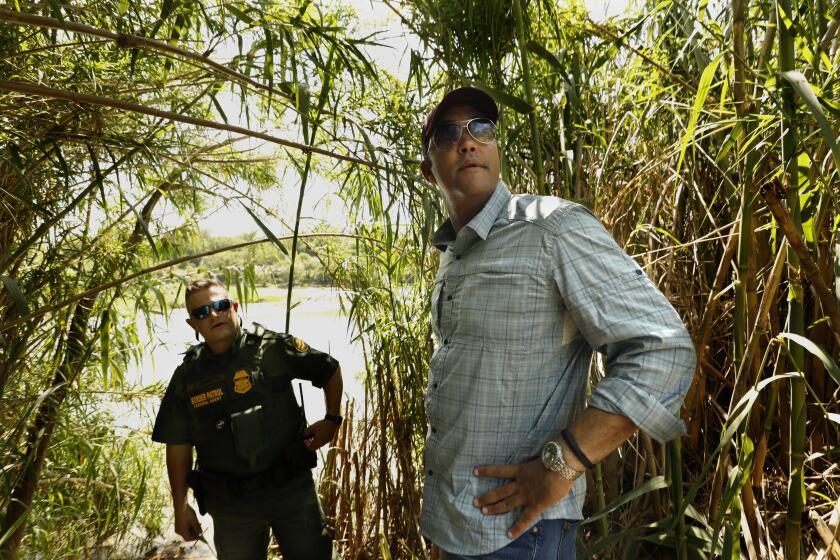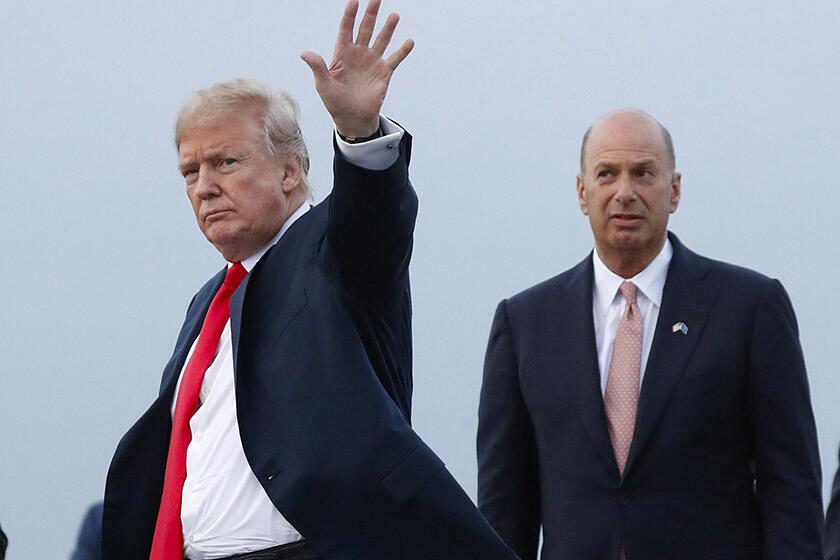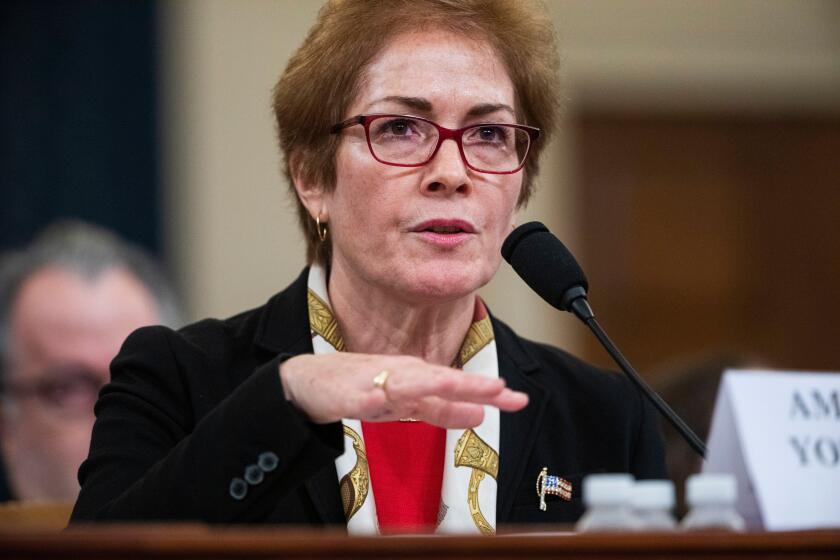Trump impeachment hearing live updates: Hill calls Ukraine campaign a ‘domestic political errand’

Trump’s former Russia advisor will use her opening statement to debunk a conspiracy theory about Ukraine interfering in the 2016 presidential election -- one that has been propagated by Rudolph W. Giuliani.
Hill’s ‘steely’ testimony captures Ukraine controversy’s sexist undercurrents
Updated at 1:04 p.m.
Former National Security Council official Fiona Hill, at times self-deprecating and “steely,” as Rep. Jackie Speier (D-Hillsborough) put it, was given a warm reception by Democrats on the Intelligence panel at the impeachment hearing. And even some of the more aggressive Republican questioners seemed to hold their fire rather than spar with the Russia expert.
In her opening statement, Hill noted that her working-class beginnings would’ve been a hindrance in England, but “never set me back in America,” where she became a citizen.
Speier’s comment on Hill’s strength came as she asked her about an anecdote, reported by the New York Times, of when a boy, when Hill was 11, set her pigtails on fire in class during an exam. Hill confirmed that she put the flames out with her hands and proceeded to finish her test.
“Very unfortunate consequences afterwards,” Hill quipped. “My mother gave me a bowl haircut.... I looked like Richard III.”
Later, asked by the Republican lawyer about being upset at EU Ambassador Gordon Sondland, Hill voiced regret for a “blow-up” at the ambassador, in part because of what she described as commonly sexist responses to women expressing anger.
“I hate to say it, but often when women show anger, it’s not fully appreciated. It’s pushed onto emotional issues or deflected onto other people,” she said.
Hill notably came back again to an undercurrent of sexism speaking of the smear campaign against former U.S. Ambassador to Ukraine Marie Yovanovitch, whom Trump ultimately recalled.
In the infamous July 25 call with Ukrainian President Volodymyr Zelensky, Trump called her “that woman” and “bad news,” and said she was “going to go through some things.” Yovanovitch testified last week that she saw the remarks as a threat.
Hill defended Yovanovitch while also criticizing reported threats against Republican Rep. Elise Stefanik of New York, who’s emerged as one of the GOP’s fiercest attack dogs throughout the public impeachment hearings.
“I do believe it was a smear campaign and I just want to say again for the record, I think it was unnecessary,” she said about the efforts to push out Yovanovitch.
At times, Hill struggled to get a word in. “Can I actually say something?” she asked after several rounds from Republican members directing statements toward her without questions.
Amid audible protest, Schiff allowed her to respond. Later, Rep. Sean Patrick Maloney of New York characterized one Republican member’s questioning, saying to Hill: “That was some epic mansplaining you had to endure.”
GOP’s Rep. Will Hurd doesn’t see an impeachable offense
Updated at 12:25 p.m.
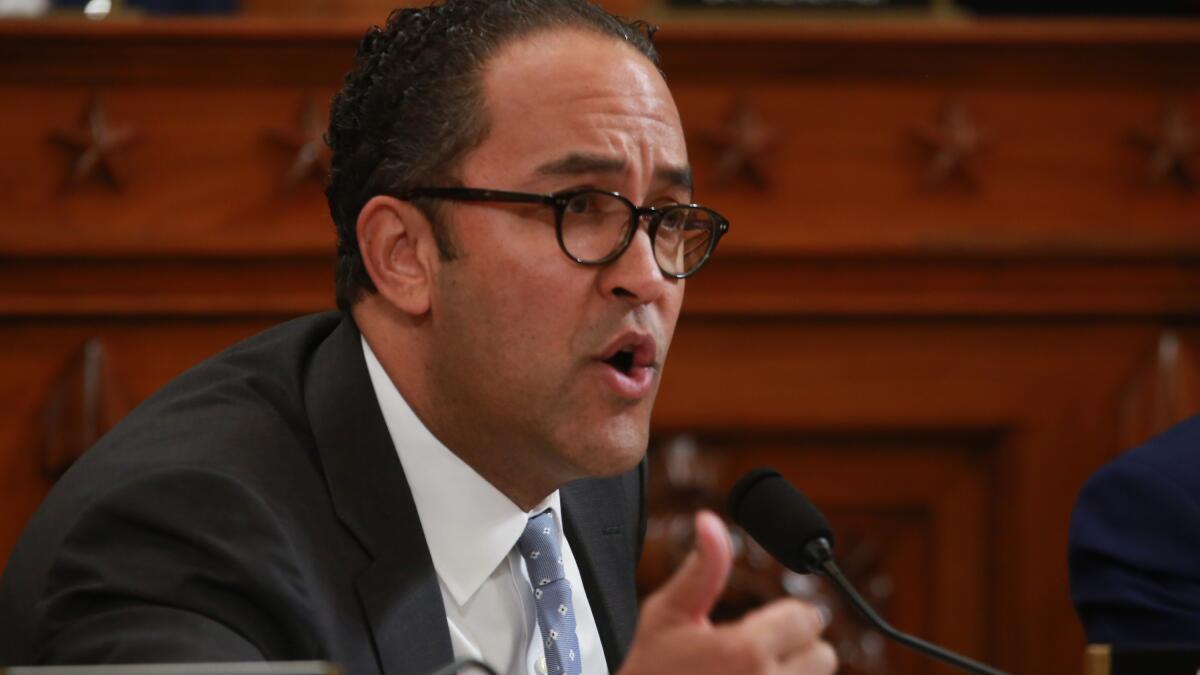
Rep. Will Hurd (R-Texas) criticized the Trump administration’s foreign policy as “bungling,” but indicated that he is not convinced that an impeachable offense occurred.
Hurd was viewed as one of the few Republicans who could possibly support impeachment.
Hurd was sharply critical of the president’s use of the phrase “do us a favor, though” and a reference to the Bidens on a July 25 phone call with Ukrainian President Zelensky, calling both comments “inappropriate, misguided foreign policy.”
Rep. Will Hurd, a Texas Republican who represents a big swath on the U.S.-Mexico border, has come to be seen as a bellwether on impeachment.
He said actions by Rudolph W. Giuliani, Trump’s personal attorney, and others undermined national security. “I disagree with this sort of bungling foreign policy,” he said.
Still, “an impeachable offense should be compelling, overwhelmingly clear and unambiguous. And it’s not something to be rushed or taken lightly,” he said. “I have not heard evidence proving the president committed bribery or extortion.”
Hurd said he wants to hear from the whistleblower, Giuliani and former Vice President Joe Biden’s son Hunter Biden.
Hill: Sondland was on a ‘domestic political errand’ doomed to ‘blow up’
Updated at 11:02 a.m.
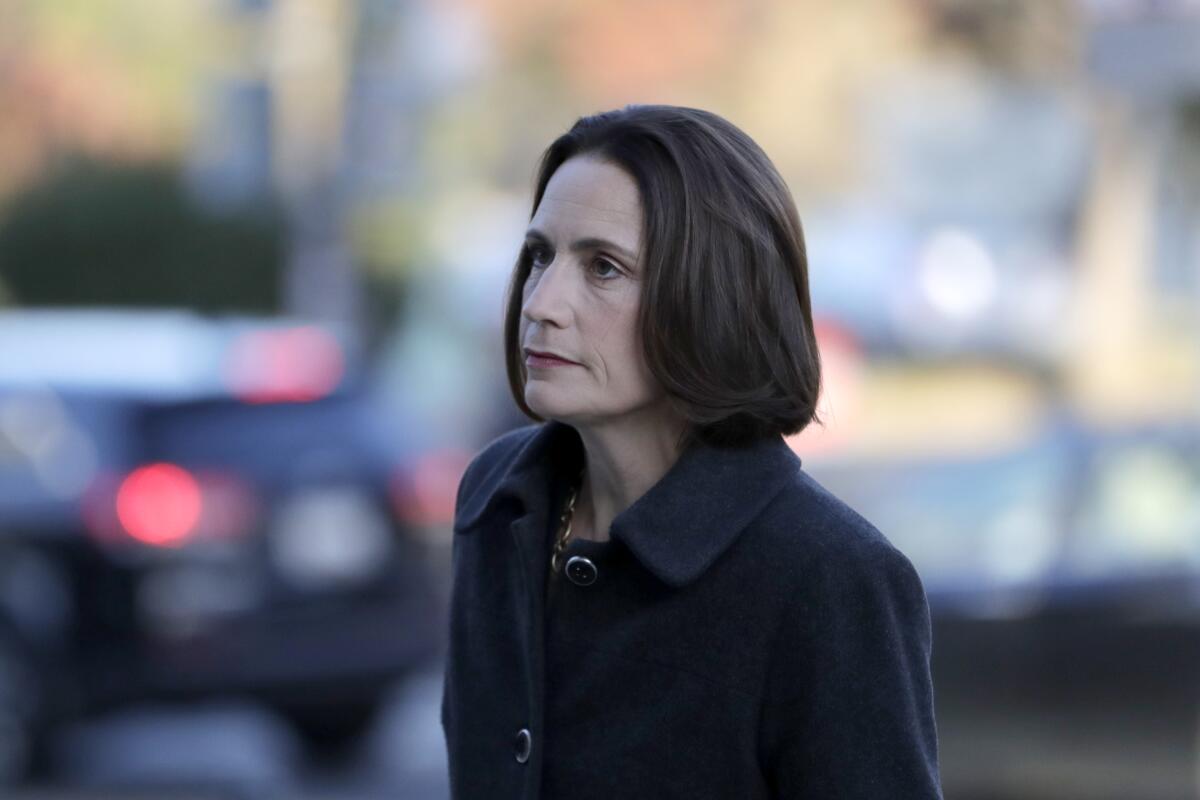
Fiona Hill, President Trump’s former Russia advisor, said she previously resented EU Ambassador Gordon Sondland’s involvement in Ukraine and his reluctance to work within traditional diplomatic channels.
But after listening to his testimony, Hill said she now understands why Sondland acted as he did: because Trump had directed him to push a separate effort in Ukraine to get the Ukrainians to conduct investigations related to U.S. politics, at odds with her work with the National Security Council.
“He was absolutely right, because he was being involved in a domestic political errand, and we were being involved in national security and foreign policy,” she said. “So those two things had just diverged.”
Fiona Hill, a top expert on Russia, testifies in the Trump impeachment inquiry on Thursday.
Her frustration stemmed from Sondland not coordinating with the National Security Council and following the normal interagency diplomatic process, she said.
“So I was upset with him,” Hill said. “He wasn’t fully telling us about all the meetings he was having, and he said to me, ‘But I’m briefing the president, I’m briefing Chief of Staff [Mick] Mulvaney, I’m briefing Secretary of State [Michael R.] Pompeo and I’ve talked to Ambassador [John] Bolton -- who else do I have do deal with?’”
Hill said when she saw Sondland’s emails pulled up on a screen during his public testimony Wednesday, she understood better their different missions.
Hill nevertheless recalled warning Sondland. “I think this is going to blow up,” she recounted saying. “And here we are.”
Holmes: Trump was assured in July 26 call Ukraine would announce investigations
Updated at 8:01 a.m. PT
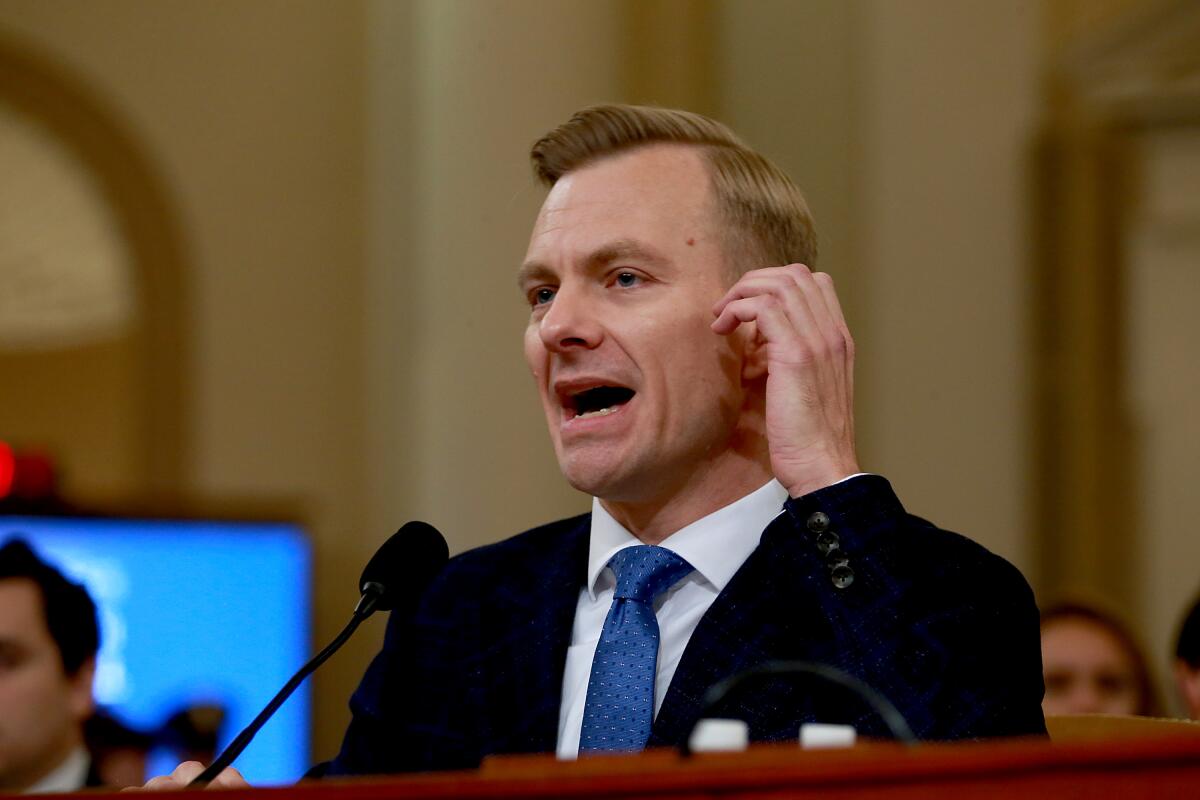
U.S. diplomat David Holmes, at Thursday’s impeachment hearing, recounted the now-infamous July 26 phone call between EU Ambassador Gordon Sondland and President Trump in an outdoor restaurant in Kyiv.
Holmes said overhearing the conversation between a president and a top advisor was a “very distinctive experience” in his foreign service career — and the reason he was able to recall so many details without having taken notes.
It was “someone at a lunch in a restaurant, making a call on a cellphone to the president of the United States,” Holmes said.
Holmes said he heard Trump’s voice, booming through the cellphone, asking Sondland if Ukraine would conduct the investigations he wanted.
“[Sondland] said, ‘Oh yeah, he’s going to do it. He’ll do anything you ask,’ ” Holmes said, adding that Sondland then added that Ukrainian President Volodymyr Zelensky “loves your ass.”
Trump spoke so loudly into the phone, it prompted a visible reaction from Sondland.
“When the president came on,” Holmes said, “he sort of winced and held the phone away from his ear.”
Trump administration still withholding key support from Ukraine, diplomat says
Updated at 7:50 a.m. PT
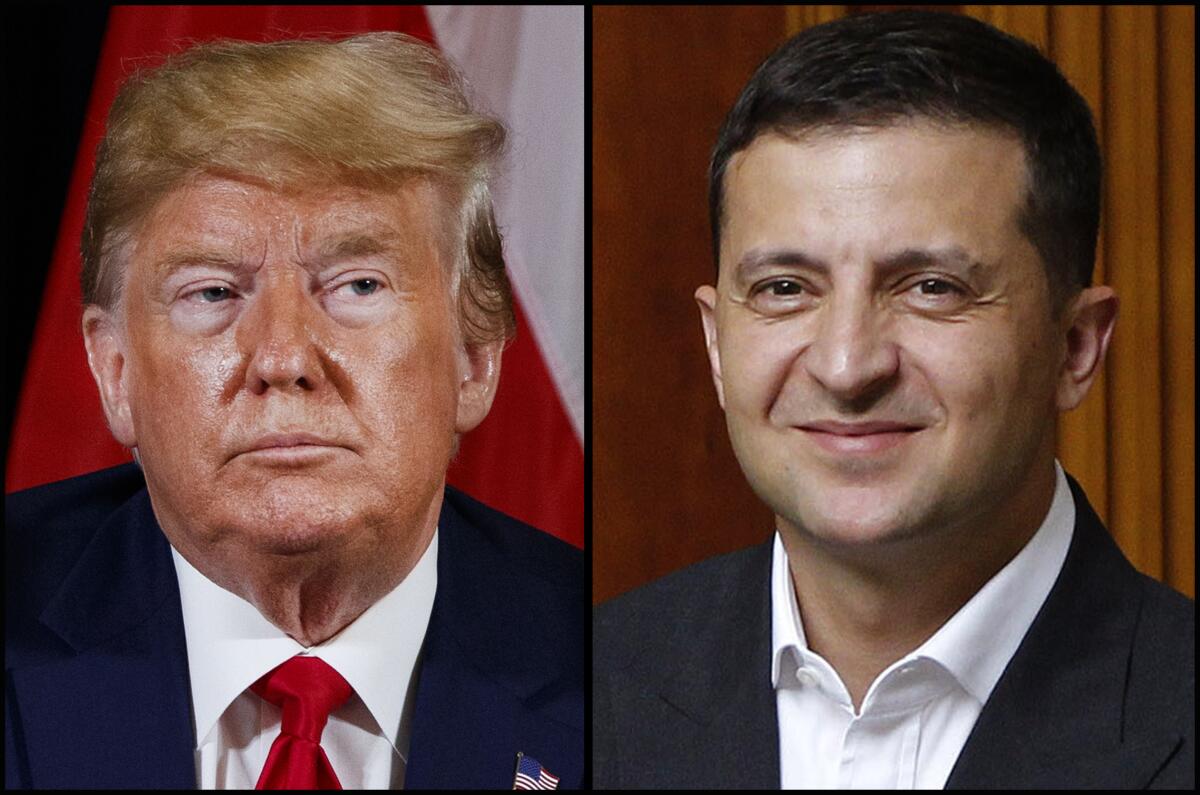
Holmes pointed out at the hearing that the Trump administration was still withholding crucial support to Ukraine, and that the government there still feels it has to tread carefully to obtain it.
Even after a hold on military and other assistance was lifted in September, Holmes said, “there were still things they wanted that they weren’t getting,” including a White House meeting with Trump.
“That still continues to this day,” he said. “They still need us now.”
He noted that Ukrainian President Zelensky was soon due to have his first face-to-face meeting with Russian President Vladimir Putin “to try and advance the peace process.” The Ukrainian and Russian presidents are slated to meet Dec. 9 in Paris to discuss the ongoing conflict with Russian-backed separatists in eastern Ukraine.
Zelensky, a former comedian, campaigned and won the presidency on promises to end the fighting.
“He needs our support. He needs President Putin to understand that America supports Zelensky at the highest levels,” Holmes said. “So this doesn’t end with the lifting of the security assistance hold. Ukraine still needs us, and as I said, Ukraine is still fighting this war to this very day.”
Holmes: Trump pushed political agenda in Ukraine starting in spring
Updated at 7:14 a.m. PT
The Trump administration began pushing a “political agenda” as early as March 2019, David Holmes, a U.S. Embassy official in Ukraine, testified at Thursday’s impeachment hearing. The effort was months before the July call that prompted the whistleblower complaint over President Trump’s efforts to pressure Ukraine to investigate his political enemies.
It started with a smear campaign against Marie Yovanovitch, then U.S. Ambassador to Ukraine, that Holmes called “unlike anything I have seen.”
The next month, a Ukrainian official told Holmes he’d been contacted by “someone named Giuliani who said he was an advisor to the vice president.”
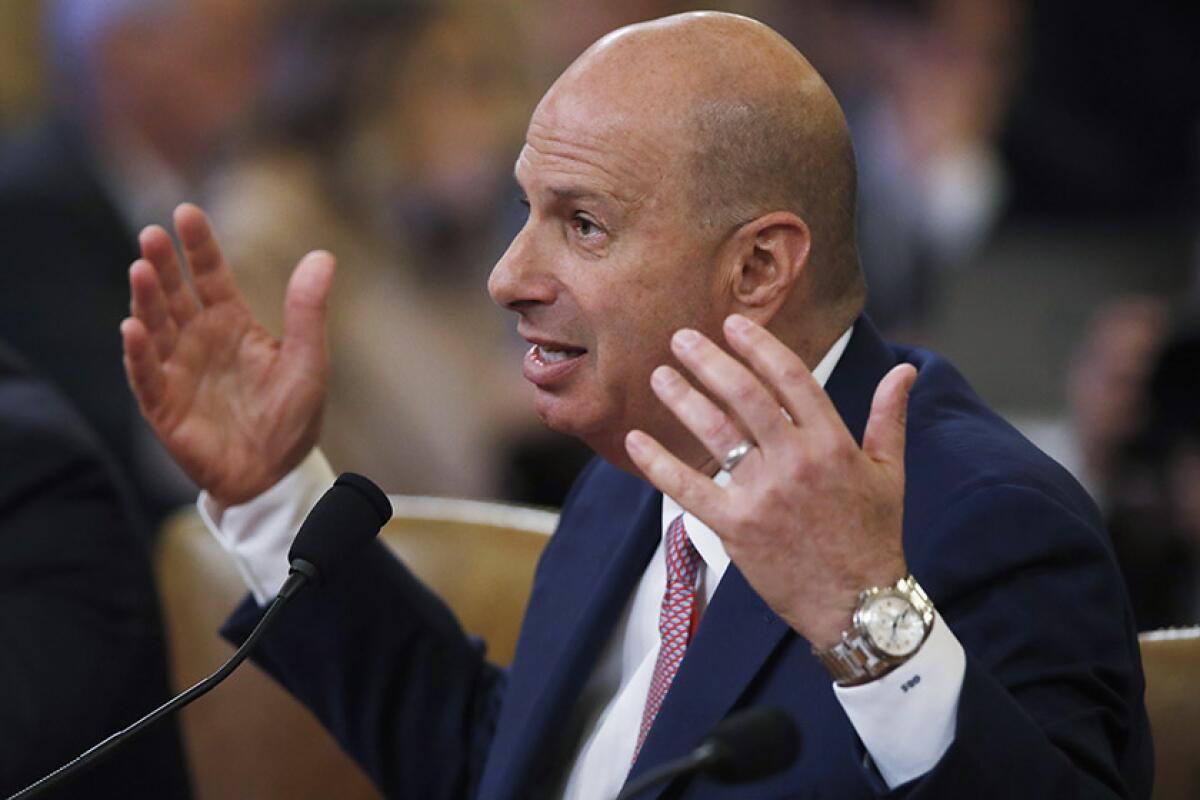
When someone wondered aloud why Giuliani and other Trump aides were so involved on Ukraine, Holmes remembered Gordon Sondland, ambassador to the European Union, responded, using an expletive, “Every time Rudy gets involved he goes and ... everything.”
Holmes: Sen. Ron Johnson warned Ukraine about Trump’s negative view
Updated at 7:11 a.m. PT
In a September meeting with Ukrainian President Zelensky in Kyiv, Sen. Ron Johnson (R-Wis.) warned Zelensky that President Trump had a negative view of Ukraine, David Holmes, a U.S. Embassy official in Ukraine, told lawmakers.
In the September meeting, Johnson told Zelensky he had been “shocked” by Trump’s negative reaction when he and other U.S. officials proposed during a May 23 Oval Office meeting that Trump show support for Ukraine, according to Holmes’ account.
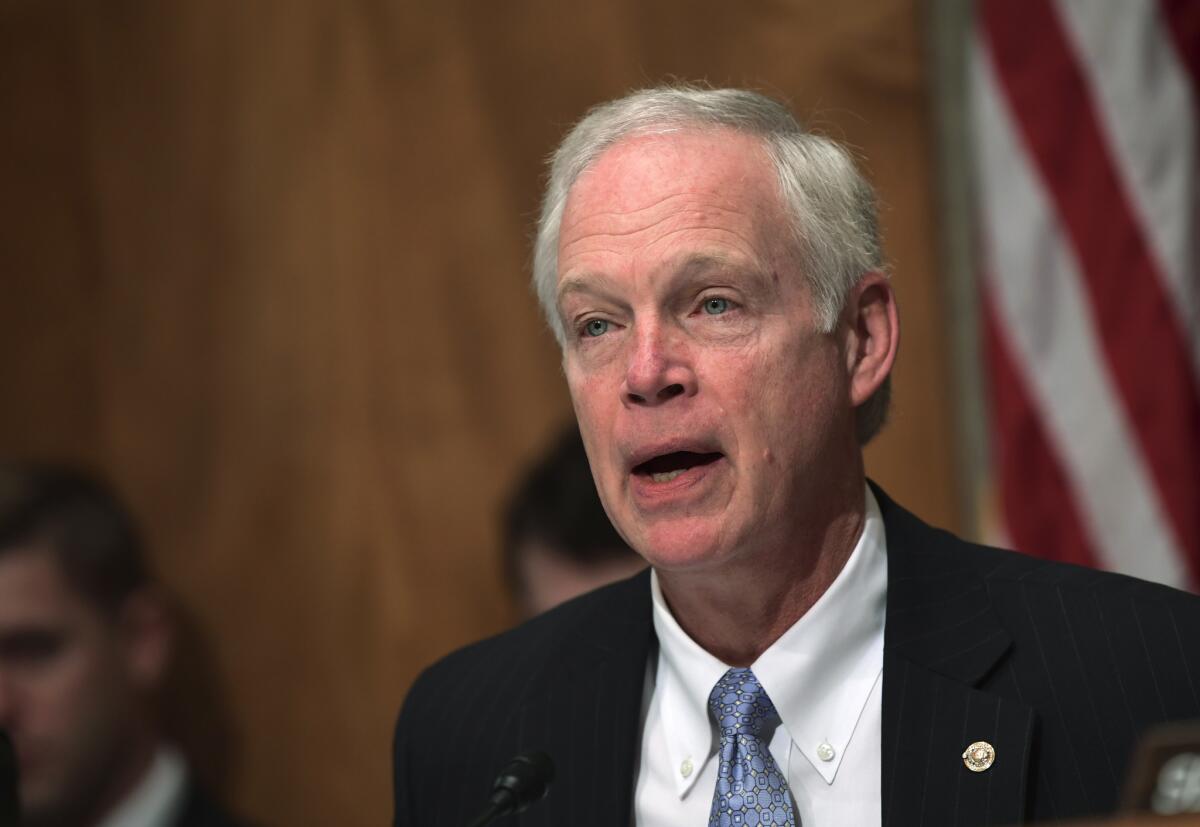
Holmes indicated that the effort to get Ukraine to commit to investigations ticked upward a few days later. William Taylor, the senior U.S. diplomat in Ukraine, told Holmes that there was a push to get Zelensky to announce on CNN that Ukraine would open investigations into Trump’s political rivals.
“I was shocked the requirement was so specific and concrete,” Holmes said. “While we had advised our Ukrainian counterparts to voice a commitment to following the rule of law and generally investigating credible corruption allegations, this was a demand that President Zelensky personally commit, on a cable news channel, to a specific investigation of President Trump’s political rival.”
Hill dismisses conspiracy theories about Ukraine election interference
Updated 5:20 a.m PT
Fiona Hill, President Trump’s former Russia advisor, will use her opening statement to debunk a conspiracy theory about Ukraine interfering in the 2016 presidential election -- one that has been propagated by the president’s personal lawyer, Rudolph W. Giuliani, and some Republicans on the panel.
The conclusion by the U.S. intelligence community and Congress that in fact Russia meddled in the election to benefit Trump, Hill said, is “beyond dispute.”
“Some of you on this committee appear to believe that Russia and its security services did not conduct a campaign against our country—and that perhaps, somehow, for some reason, Ukraine did,” she said. “This is a fictional narrative that has been perpetrated and propagated by the Russian security services themselves.”
“I would ask that you please not promote politically driven falsehoods that so clearly advance Russian interests,” she will say.
Fiona Hill, a top expert on Russia, testifies in the Trump impeachment inquiry on Thursday.
Fiona Hill, David Holmes testify before House impeachment committee
Fiona Hill, President Trump’s former Russia advisor, and David Holmes, a U.S. Embassy official in Ukraine, are set to give public testimony in the impeachment inquiry on Thursday.
Hill and Holmes follow a string of current and former officials who have testified in recent days that U.S. aid to Ukraine was held up and a proposed White House meeting delayed while Trump pushed for Ukraine to announce investigations of Trump’s political opponents.
Almost everyone in Trump’s orbit confronts the same dilemma, sooner or later: Stick with Trump and risk lasting damage, or break away and hope to survive his wrath. Gordon Sondland broke away in spectacular fashion.
In private testimony previously, Hill told congressional investigators that John Bolton, the president’s former national security advisor, called Trump’s personal lawyer, Rudolph W. Giuliani, a “hand grenade who is going to blow everybody up.” Bolton also sarcastically referred to efforts by Giuliani and other Trump aides to conduct a shadow U.S. foreign policy in Ukraine and force its new government to conduct the investigations as a “drug deal” he wanted no part of, according to Hill.
At Bolton’s request, Hill had at least two meetings in July with the National Security Council’s lawyer over alarm about Giuliani’s efforts. Those took place weeks before the now infamous July 25 call between Trump and Ukrainian President Volodymyr Zelensky that prompted a whistleblower complaint, and ultimately, the impeachment inquiry.
Hill resigned as the president’s national security advisor on Russian and European affairs a week ahead of the call.
Hill emphasized in a short opening statement that she is a nonpartisan foreign policy expert, having served for about 30 years under Republican and Democratic administrations. Being born in England — “an American by choice” — has “never set me back,” she wrote in her prepared remarks.
“I have no interest in advancing the outcome of your inquiry in any particular direction, except toward the truth,” she wrote.
On July 26 in Kyiv, Holmes — a detailed note taker — said he overheard a cellphone call in which Trump asked about the investigations.
Perspective: Marie Yovanovitch, William Taylor and other career diplomats, quiet and dignified, have become stars during the impeachment hearings.
That call, between Trump and the president’s ambassador to the European Union, Gordon Sondland, took place in a busy Kyiv restaurant on an unsecured, open line, Sondland confirmed in bombshell testimony on Wednesday. After reports of the restaurant call emerged in other officials’ testimony, the House Intelligence Committee holding the hearings added Holmes to the docket, to appear alongside Hill.
Trump says he doesn’t remember the July 26 call.
More to Read
Get the L.A. Times Politics newsletter
Deeply reported insights into legislation, politics and policy from Sacramento, Washington and beyond. In your inbox three times per week.
You may occasionally receive promotional content from the Los Angeles Times.
